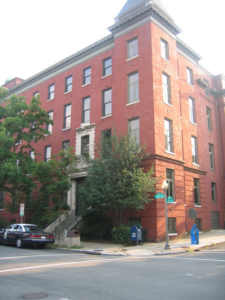The Nevils dormitory experienced multiple false fire alarms on the nights of Oct. 9 and 10, as well as the afternoon of Oct. 16.
An electronic circuit switch fail caused the false alarms, according to a joint statement made by Georgetown University Facilities Management and the Office of Residential Living in an email to East Campus residents Oct. 25. Nevils, an apartment-style residential community located on East Campus, houses mostly upperclassman students.
“Upon identifying the fault, we inspected the relevant system and repairs were made. We will continue to monitor the system and will perform tests if necessary,” the email said.

The Oct. 9 fire alarm sounded intermittently for over two hours, starting at around 2 a.m., according to Nevils resident Marshall Webb (SFS ’20). Residents evacuated from the building when the alarms sounded but became confused as the alarms continued and no police cars or fire trucks arrived at the scene, according to Charlotte Hine (MSB ’19).
“It was close to 25 minutes before we saw anyone of authority,” Hine wrote in an email to The Hoya. “At 4:30 a.m., someone who appeared to have authority finally told us that we could re-enter the building, and that facilities would shut off the alarm shortly. It took over 90 minutes to shut off the alarm.”
Students were given the all-clear to return to the building before the fire alarms were turned off, according to Webb.
The alarms sounding in the middle of the night posed a disruption to many students who were trying to sleep, Hine said.
“Many people chose not to go back into their apartments because the noise was too loud. Some slept in the hallways until the alarm stopped. I used earplugs and pillows to block the noise,” Hine said. “I had a job interview the following day. Others had early classes, midterms, and work commitments.”
Alex Mitchell (SFS ’21), another Nevils resident, echoed Hine’s sentiment that the fire alarms disrupted his sleep. On the second consecutive night of alarms, Mitchell left Nevils and slept on a friends’ couch in another dormitory.
“We sat on our little balcony while the sirens blared. We couldn’t even be inside,” Mitchell wrote in an email to The Hoya.
As the alarms continued, some students stopped leaving their apartments, according to Webb.
“With each evacuation, the number of people you see leave the building is lower and lower and lower,” Webb wrote in an email to The Hoya.
Hine emailed the Office of Residential Living to ask about the possibility of receiving a refund of the nightly rate of the housing fee for the two dates in question. Her request was denied.
“I was told they do not issue refunds for these types of issues,” Hine said.
Students will be notified of the cause of any future fire alarms, according to the email from the Georgetown University Facilities Management and the Office of Residential Living.
“In the spirit of open communication, we will notify all East Campus residents of the cause of each future fire alarm tests via e-mail within 12 hours of each event,” the email said.




















